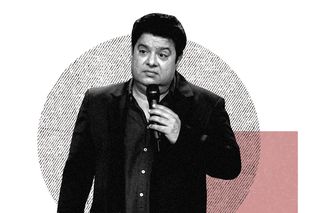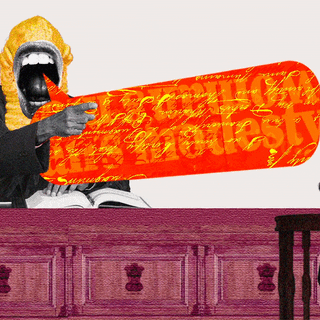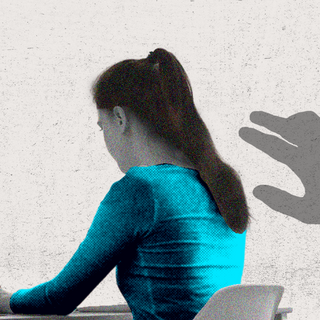
Sajid Khan’s ‘Bigg Boss’ Participation Shows How Reality TV Whitewashes #MeToo Accused
The reality show serves to whitewash his image, becoming another site of violence for victims and survivors.

It’s not a rare occurrence when someone accused of something vile makes a one-off public resurgence. Sometimes, there are even attempts to excuse or justify the “goodness” in the vile. But Bigg Boss defied that mold in featuring Sajid Khan — a man accused of sexual abuse by multiple women — as a contestant in its latest season, thus normalizing his continuous presence on a large platform. Khan cooks, cleans, performs comedy, and engages in witticisms with Salman Khan on national television in front of millions of Indians. This is a promotion and vindication of his personality and abuse, catalyzed by the unwitting medium of reality television.
Rightly, people have started a petition online demanding that Sajid Khan be evicted from the house, noting that he is “allowed to redeem and whitewash his image by participating on Bigg Boss, a reality show watched by millions in our country. This is sickening, and this is vile. It is extremely insulting and demoralizing to victims and survivors who continue to fight for justice today.”
There is a disturbing library of accusations against Khan: he has allegedly flashed his penis at women at parties; watched porn in front of colleagues; asked for nudes as part of the casting process, and has been sexually offensive. His #MeToo accusations are not a new revelation; in instances more than one, he has reportedly asked women to feel his penis, or coerced them to strip in orderto land a role.
There is a social amnesia when it comes to forgetting the misdemeanors and violence of famous people. But Sajid Khan’s “comeback” on reality television is an indictment of just how rigidly the system is designed to favor the abuser. But in this particular instance, a unique question comes up: what happens to accountability and consequences when this process of erasure happens on reality TV?
The genre of reality TV taps into the idea of psychological proximity, presenting an intimate portrayal of person who is otherwise removed by virtue of their social status and distance. The show almost works like a looking glass, where an audience of millions peers into people’s lives and learn about them, which feeds into the audience’s own intrigue, aspirations, and desires. There’s also a curious sympathy that develops with participants, as people root for some and against others. Then the presence of #MeToo accused people like Sajid Khan is steeped in notoriety; Khan lamented how he was kicked from movies and has struggled to find work, a narrative that exists in a vacuum without any rebuttals from the host or the channel, and primed to evoke sympathy from viewers. There is a visceral rehabilitation of Khan’s image, with people almost tempted to root for the “new and improved” Sajid.
Unlike regular shows or movies, “[reality TV] gives us a way to look into the lives of people we can relate to as they’re tasked with an abnormal task that challenges their strength and character,” a paper noted.
Related on The Swaddle:
#MeToo One Year Later: Where Are All The Accused Men?
Moreover, a common hypothesis around the psychology behind watching reality TV argues much of it stems from people’s desire to feel “self-important” and superior over the participants. Voyeurism plays a role too, as people take pleasure in watching someone lose a task or say something incredibly vile. What makes someone depraved and malicious is also what makes them entertaining on the small screen. Arguably, reality TV also pushes the boundaries on what’s socially acceptable and what isn’t, further normalizing a narrative where it’s almost okay for perpetrators to glide past their notoriety.
What is graver is the impact this presence has on victims and survivors of abuse. The genre of reality TV means having to humanize your perpetrator, watching them day in and day out, living a life of public attention. In that sense, Bigg Boss is also a unique specimen. Unlike movies where people like Alok Nath and Nana Patekar play a part, or the likes of Vikas Bahl and Raju Hirani whoare concealed behind a role or the camera, reality TV presents the perpetrator day after day, erasing whatever distance that might have been formed over time. There is something sinister about having the entirety of internet culture point out his moments of humanity. “He is an abuser, but…” the narrative goes. The reality show then serves not only to whitewash his image, but also becomes a site where the violence is repeatedin an endless loop. What’s more: Khan’s history of sexual harassment may even be the dark horse behind his comeback — where it’s an active part of his redemption narrative. Arguably, the harassment is ostensibly an important reminder of how much he “changed” as a person, and why he deserves a second chance — both arguments that further erase survivors and their trauma.
The whitewashing is insulting and triggering in ways more than one. While #MeToo accused get a renewed lease in the industry, people who speak up against men in power are met with cultural and social erasure. Their identity is almost always linked to being a victim, in addition to meeting with the compounded challenges of navigating an industry with in-built aggression. Contrast this with the opposite effect that reality TV has on participants’ careers; people attain a celebrity status or revive their fame of lives past with new podcasts, blogs, endorsements, even movie roles. Reality TV can offer abusers a chance to reinvent their careers, a process that unfolds slowly and perniciously in front of us.
Much of this is also a charge against the channel and network for paying no heed to the social and moral concerns at hand. Khan’s infamy isknowingly or unknowingly monetized in the vacuous quest for money and TRPs. Study after study has noted the highly addictive natureof reality TV by virtue of the high stakes, the manipulation, the carefully contrived drama that Bigg Boss is no stranger to. The network and the abuser become intertwined in a powerful nexus, further attacking the veracity and gravity of sexual abuse within the industry.
There is then something inherently flawed with viewing the medium of reality TV as a “social experiment,” allowing for anything in the name of drama without having to reckon with the consequences of valuing ratings over compassion. This production of “family entertainment” plumbs new depths of depravity, reproducing violence and rewriting wrongness.
Saumya Kalia is an Associate Editor at The Swaddle. Her journalism and writing explore issues of social justice, digital sub-cultures, media ecosystem, literature, and memory as they cut across socio-cultural periods. You can reach her at @Saumya_Kalia.
Related


Can We Ever Rewrite the Sexism, Casteism Woven In the Language of Indian Courts?
